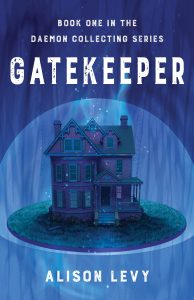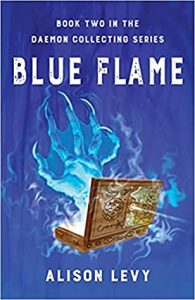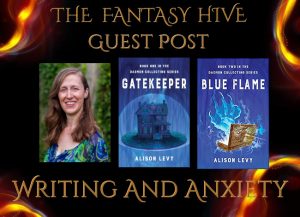Writing and Anxiety – GUEST POST by Alison Levy (BLUE FLAME)
Writing and Anxiety
by Alison Levy
Having an anxiety disorder is weird. Anxiety itself is a healthy emotion; it’s a normal response to stress, meant to heighten mental awareness and prep the body to react to danger. However, suffering from an anxiety disorder means there’s a short circuit between my brain’s rational assessment of a situation and my body’s reaction to it. Something I see or hear triggers something in me—maybe just a stray thought or a disconnected memory—and suddenly my body is overwhelmed with fear and/or tension. I can explain with absolute clarity why my feelings are illogical but that doesn’t make the emotions stop or make them feel less real. I know I’m freaking out about a danger that only exists in my head but I live in this head. To me, it IS real.
 Growing up, I didn’t know that I had an anxiety disorder although looking back on my childhood, it was very obvious. I was so terrified of making any mistake that I wouldn’t turn in assignments—self-sabotage always seemed preferable to being judged and found wanting. Stomach aches, brought on by tension and worry, often resulted in me missing school, and at one point I even developed a facial tic. I cried a lot but I learned how to do it quietly behind closed doors so I wouldn’t get scolded by my parents. I was a ball of nerves. I really should have been diagnosed and treated but anxiety disorders were not widely acknowledged in the 90s. Besides, my parents are of the generation where you, to quote Miranda Lambert, “get a grip and bite your lip just to save a little face.” I was told my issues were a result of my “bad attitude” and that I needed to stop acting up. I was on my own.
Growing up, I didn’t know that I had an anxiety disorder although looking back on my childhood, it was very obvious. I was so terrified of making any mistake that I wouldn’t turn in assignments—self-sabotage always seemed preferable to being judged and found wanting. Stomach aches, brought on by tension and worry, often resulted in me missing school, and at one point I even developed a facial tic. I cried a lot but I learned how to do it quietly behind closed doors so I wouldn’t get scolded by my parents. I was a ball of nerves. I really should have been diagnosed and treated but anxiety disorders were not widely acknowledged in the 90s. Besides, my parents are of the generation where you, to quote Miranda Lambert, “get a grip and bite your lip just to save a little face.” I was told my issues were a result of my “bad attitude” and that I needed to stop acting up. I was on my own.
I started writing in middle school after an English assignment of mine received praise from my teacher (thank you Mrs. Webb!). As the years went by, I learned how transformative writing is on my mental state. When I sit down to write, my brain undergoes a change. Like when the lights in a movie theater dim, reality fades away and the fictional story fills my mind. Wrapped in a comfy blanket with my headphones shielding me from intrusions, the anxiety-inducing real world gets swept into the shadows while I build a new world from the ground up. Unlike the rest of reality, everything I write is within my control. I may, like many authors, feel that my characters at times take on a life on their own and insist on deviating from my story outline but that never triggers my anxiety. They all come from me, are extensions of me, and can do nothing unless I write them doing so.
No surprises. No stressors. No anxiety.
I used writing instinctively throughout my teenage and young adult years, retreating to it any time I got stressed. It got me through hard times and made the good times even better. But it fell by the wayside when I had my son. I knew going into parenthood that babies are time-consuming but I was not prepared for how anxiety-inducing they can be. Those first few months are a blur in my mind but I clearly remember the near-constant state of fear and despair. After I was diagnosed with post-partum depression and received treatment, I pulled myself together enough to get into a routine. But I wasn’t writing. And I was never far from an anxiety attack.
 When my son was a little older, I started seeing signs of anxiety in him. I did some reading on the disorder and in the symptoms, I saw not only him, but myself. Suddenly, the emotional roller coaster of my life made sense. Driven by a desire to improve for my son’s sake as well as my own, I went into therapy. To my surprise, one of the things my therapist recommended was that I return to writing. She understood what I had never quite put together: that writing is therapeutic for me.
When my son was a little older, I started seeing signs of anxiety in him. I did some reading on the disorder and in the symptoms, I saw not only him, but myself. Suddenly, the emotional roller coaster of my life made sense. Driven by a desire to improve for my son’s sake as well as my own, I went into therapy. To my surprise, one of the things my therapist recommended was that I return to writing. She understood what I had never quite put together: that writing is therapeutic for me.
I noticed an improvement in my mental state almost immediately. Taking some time each day to disconnect from reality, from everything that stresses and triggers me, was so refreshing! Even if it was just for a short time, the anxiety would melt away while I switched gears from daily life to world building and character development. It gave my brain a chance to indulge in something pleasurable and soothing, which allowed my body to disengage from the tension and fear. I came away from every writing session feeling calmer and more in control of myself. Over time, I made a point to set aside some time each day for writing; it’s made me happier, healthier, and a better mom.
While writing isn’t a cure for my disorder—it’s as much a part of me as my eye color—it has proven to be the most effective means I have of managing my anxiety. By redirecting my mind away from real-life and into a sphere where I have total control, I break the cycle of negative emotions and intrusive thoughts that work me into an anxiety attack. That gives me better control over my emotions, over myself. And so, wrapped in a blanket and wearing my headphones, I cope and I write on.
Alison Levy lives in Greensboro, North Carolina with her husband, son, and a variety of pets. When she is not writing or doing mom things, she crochets, gardens, walks her collies, and works on home improvement projects.
Her books feature female characters who are strong but flawed, making them more relatable. They stay rooted in everyday life while world-building in their fictional cultures. Intolerance of differences has become widespread in recent years. Gatekeeper encourages readers to look beyond what they consider normal and see through foreign eyes, a message that I hope will appeal to many in today’s climate.
Blue Flame is the second instalment in Alison’s Daemon Collecting series and is available HERE
Rachel comes from a dimension that exists adjacent to ours. The people there have structured their society around daemon collecting: they locate, catch, and repair malfunctioning daemons (creatures out of phase with our world that tempt people to do good or evil).
While introducing Leda Morley, last of an ancient line of gatekeepers, to the ins and outs of her daemon-collecting work, Rachel Wilde encounters something far more dangerous than any daemon: a young boy who stands alone against an unseen yet terrifying enemy that has invaded his home—an inhuman creature who, hellbent on revenge for a minor slight, intends to harm the boy’s oblivious family. Meanwhile, Leda’s brother, Simon, is feeling left out of his maternal family legacy but is coping partly by helping Rachel’s friend Bach—a previously homeless man with unusual mental abilities—get his life back on track.
In the midst of all of this, Bach unintentionally but serendipitously makes contact with a capable otherworldly being who, with great reluctance, agrees to help Bach and his friends take on the dangerous creature that’s just become their problem to solve. Together, this group of unlikely allies must put aside their differences to save an innocent child, and his family, from a monster—before it’s too late.


[…] Over at the Fantasy Hive, there’s a great guest post from Alice Levy talking about anxiety and writing […]